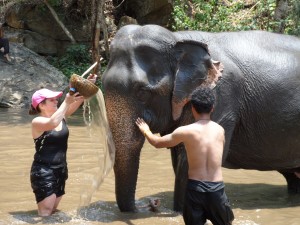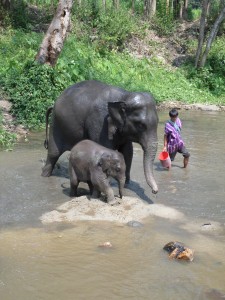By: Kirsten Louy-Nasty, CEO of Asia Transpacific Journeys
 As a key member of the Asia Transpacific Journeys team, a U.S.-based company that creates custom journeys and small group trips to the Asia Pacific region, one of the most frequently asked questions I receive from those I meet is about elephants. People tell me how much they love these animals, and then proceed to ask me about my encounters with them on my travels. The love of elephants certainly transcends our culture, and in fact, has very deep roots. In Asia, elephants are viewed as a symbol of strength, wisdom and intelligence. Hindus even have a beloved elephant-headed deity, Ganesh, who is the god of wisdom and learning, the remover of obstacles and consequently the sign of auspiciousness. Perhaps one of the most marked symbols of this region, you would be hard-pressed to visit Asia without glimpsing an elephant or its likeness on buildings, temples, art or clothing.
As a key member of the Asia Transpacific Journeys team, a U.S.-based company that creates custom journeys and small group trips to the Asia Pacific region, one of the most frequently asked questions I receive from those I meet is about elephants. People tell me how much they love these animals, and then proceed to ask me about my encounters with them on my travels. The love of elephants certainly transcends our culture, and in fact, has very deep roots. In Asia, elephants are viewed as a symbol of strength, wisdom and intelligence. Hindus even have a beloved elephant-headed deity, Ganesh, who is the god of wisdom and learning, the remover of obstacles and consequently the sign of auspiciousness. Perhaps one of the most marked symbols of this region, you would be hard-pressed to visit Asia without glimpsing an elephant or its likeness on buildings, temples, art or clothing.
As such, it is no surprise that the majority of travelers to Asia place an elephant experience at the top of their must-do lists. And true to our mission, Asia Transpacific Journeys has always sought to provide our travelers with authentic, experiential and conscientious avenues for elephant interactions, making this topic always top-of-mind for us. However, as of late, it has also become a divisive, public-facing issue; so much so, that our company was recently asked to immediately stop offering our travelers access to festivals in which elephants are involved, and to end all access to experiential elephant encounters. And, while I’ve been asked to provide a definitive yes or no answer to this request, I feel strongly that this important issue is not completely black or white.
As a company, we have deep, longstanding relationships (forged over more than three decades of business) with our on-ground partners, and work only with elephant programs handpicked for their exemplary level of concern for the animals in their care. These programs teach travelers and the surrounding communities about elephant habitat, communication within the herd, health, welfare and conservation (experiences that were not readily available years ago). And, it should be noted that by facilitating this connection for our travelers, these elephants have access to funding for medical care, food, habitat and continued access to a herd (which, as social animals, is very important to their well-being).
Within ATJ, we do not promote elephant camps that subject the elephants to hours of constant riding, or that have been cited for any issues with elephant health or welfare. Sadly, what is difficult to understand is that there are very few tracts of unbroken elephant habitat remaining in Asia – not nearly enough to support the present elephant population. Releasing all captive elephants into the wild, as many animal welfare groups have supported, would be disastrous to their well being, making it all the more important for companies like ourselves to cooperate with organizations that are promoting sustainable and ethical educational elephant tourism in order to protect these beautiful and endangered creatures.
 Furthermore, it is also important to remember that we cannot dictate our perspective on economies and societies that have been living and working with elephants for centuries. As I mentioned earlier, the elephant is a cultural and religious symbol for many Asian communities, and subsequently, plays an integral role not only in society, but also in religious ceremonies and festivals. As a travel company, we aim to open doors to different cultures for our travelers, and it is our hope that in doing so, we will allow our travelers to understand and appreciate these distinct perspectives in an authentic way. By ceasing to offer experiences with an animal so integral to tradition, community and the local economy, we would be insulating our travelers from a true authentic experience, and actively choosing to not be part of the solution.
Furthermore, it is also important to remember that we cannot dictate our perspective on economies and societies that have been living and working with elephants for centuries. As I mentioned earlier, the elephant is a cultural and religious symbol for many Asian communities, and subsequently, plays an integral role not only in society, but also in religious ceremonies and festivals. As a travel company, we aim to open doors to different cultures for our travelers, and it is our hope that in doing so, we will allow our travelers to understand and appreciate these distinct perspectives in an authentic way. By ceasing to offer experiences with an animal so integral to tradition, community and the local economy, we would be insulating our travelers from a true authentic experience, and actively choosing to not be part of the solution.
Should we concede to the request sent to us, and immediately cease working with companies that provide ethical and educational elephant experiences, we would not only be pushing another culture’s viewpoint onto our travel partners, but would also be completely turning our backs on the communities responsible for caring for these animals, and in effect, on the elephants themselves. Instead, we choose to support efforts that value animal welfare and transparency as much as we do, and thus continue to evolve standard elephant experiences towards an even more conscientious and sustainable direction.
Today — more than ever -— the ability of the travel industry to act as real change makers is increasingly apparent. By demonstrating that we will only work with in-country elephant experience partners who align with stringent ethical guidelines, we strengthen our impact, and can reach far beyond the local partners with whom we work: When less honorable elephant organizations repeatedly see that caring for their elephants ethically will result not just in moral, but also economic benefits, the positive impact can be sweeping.
Our commitment to elephant welfare also extends to the charitable arm of our company, the Asia Transpacific Foundation, as well. Having successfully completed a clean water initiative in Myanmar last year, our efforts have shifted, and we have begun to support elephant conservation and education. Our foundation is currently working with The Elephant Nature Park in Thailand where distressed elephants that have been mistreated or have had a lack of natural habitat or medical or nutritional care are rescued and rehabilitated. The company has been involved in dozens of rescues, and has subsequently created a new - and thriving - elephant herd. Volunteers and visitors contribute to the healing, as they then become an ambassador to speak on behalf of the elephant to others.
Offering only ethical elephant experiences is a challenge that we, as travel providers, have committed to pursue. This will not only directly benefit elephant conservation efforts in Asia, but it will also help raise awareness of this very important issue among our travelers who visit these sanctuaries. Should we completely deny our travelers of elephant experiences, we feel we’d be doing a disservice not only to them, but to the local communities and elephants in Asia whom we support: There will be no witnesses for the elephants, no one to speak on their behalf, unless we support this vital educational and experiential component.
------------------------------------
Kirsten grew up in our nation's capital, dreaming of destinations far and away. She landed in Papua New Guinea to participate in a grassroots organization studying women and small businesses, and subsequently created and received the first Cultural Studies Bachelor of Arts at Keene State College in New Hampshire. Her travels have taken her throughout four continents.
